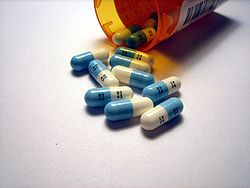Published: March 11, 2010

Divining the Right Drug , Scientific American reports on a new device that may take the guesswork out of prescribing an antidepressant that works.
Imagine suffering from the crushing weight of major depression, then finally getting diagnosed and starting treatment with a drug—only to realize after two months that the medication, despite its unpleasant side effects, is not alleviating your depression. Unfortunately, this experience is far from rare: more than two thirds of patients with depression have no luck with the first medication they are prescribed and must also endure the withdrawal effects that come with discontinuing a drug before trying a new one. Finding the right treatment can prove a lengthy, painful process of trial and error. A new technology, however, may bypass this ordeal by gauging very early in a treatment regimen how well a drug is working based on the patient’s brain waves. continue reading
Source: Scientific American
In a new issue of Biological Psychiatry, published by Elsevier, researchers from the National Institutes of Health report that another medication, scopolamine, also appears to produce replicable rapid improvement in mood.Scopolamine temporarily blocks the muscarinic cholinergic receptor, thought to be overactive in people suffering from depression. [continue reading…]
Published: February 18, 2010

Fluoxetine HCl 20mg Capsules (Prozac)
Researchers at UQ’s Queensland Brain Institute have uncovered how antidepressants stimulate the brain to improve a person’s mood.
They have discovered the class of drugs that increase levels of a neurotransmitter known as ‘norepinephrine’ triggers neurogenesis – the growth of new neurons – in a brain region called the hippocampus.
“If you block hippocampus neurogenesis, antidepressants no longer work,” lead researcher Dr Dhanisha Jhaveri said.
“That suggests antidepressants must up-regulate neurogenesis in order for them to actually have any affect on behaviour.”
However, the neuroscientists also found not all antidepressants worked in the same way. [continue reading…]
Published: February 5, 2010
Physicians use a variety of therapies to treat depression, including antidepressant medications. A new study reviewing research on these drugs shows while they offer a substantial benefit in treating very severe depression, they seem to have little or no effect treating mild or moderate depression. Catherine Dolf has more in this week’s JAMA Report.
Source: American Medical Association (AMA)


